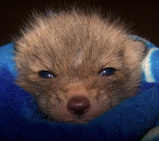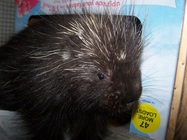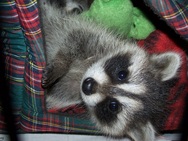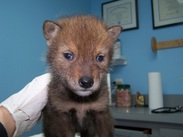What to do when you find a baby mammal. Is it really orphaned?
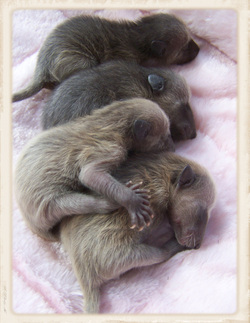
If you see a baby alone, don't just assume it's orphaned. Many animal mothers watch their babies from afar and a lot of babies that come into rehab are kidnapped by well intentioned people who would be better off leaving them alone. If the animal appears sick or injured, contact a rehabilitator immediately. If not, are you able to find the nest or den it came from? Is it intact? If so, place the baby back in the den. Not sure, call a rehabilitator! Reuniting it with the mother may be possible. Depending on the species, reuniting methods may differ so it is always a good idea to consult with a rehabilitator to decide how best to attempt a reunion. For the most part, you can put the baby in a shallow box with a soft cloth and hot water bottle if needed to keep it warm. Keep an eye on the baby from a distance. If the mother is around it will not come back while people are in the area. If the baby is still there after a few hours call a rehabilitator. If the baby is a possum it is most likely orphaned. Mother possums are constantly wandering and generally do not notice if a baby drops off. They just keep moving on so they are not likely to go back to look for the little one either.
Two Important Things:
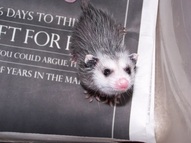
Always wear gloves when handling animals and NEVER try to feed the baby! Especially do not try feeding cow's milk or human baby formula to any baby mammal. A rehabilitator can advise you on how to try to rehydrate the animal if there is going to be a delay transporting the animal. If they are truly orphaned or injured they are most likely in shock. Feeding them will only cause more problems and can even cause their death.
Squirrels
Most diurnal (daytime) animals, such as squirrels, will reclaim their babies during the daylight hours. You can set up a small nest in a basket or small box and secure it with the baby, soft cloths and small hot water bottle (an empty soda bottle filled with hot water) up in a tree near where you think the nest is. If the baby is still out there after dusk, it must be brought in to keep it safe from predators and the cold. Keep it in a dark, warm, quiet place and if it is known that the mother is definitely still around, an early morning attempt to reunite can be made just before dawn. If the baby is still there by midday rescue is most likely necessary.
Raccoons
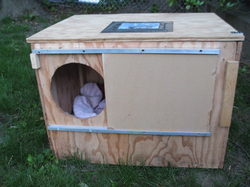
Raccoon reuniting box.
Nocturnal animals tend to come back for their babies when it gets dark. Raccoons are excellent mothers and want their babies back if they are OK and were separated from them for some reason. We have a reuniting box made especially for raccoons. It has a sliding door on it and the baby is kept safe and warm inside until mom returns, slides the door open and takes her kit to a new location. If you don't have access to a rehabber with a reuniting box, you can easily set something up yourself. Wearing gloves, place a towel over the baby and scoop it up. Place it in a box or open top container with soft cloths and a hot water bottle if needed to keep the baby warm. Put it near where you found the animal. Place a laundry basket upside down over the box and a small weight (like a brick) on top. This will protect baby from other predators but mom raccoon will be strong enough to pull the basket over to get at the baby. Leave the basket out overnight (consideration such as temperature and weather should be considered). If the baby is still there the next morning the baby most likely needs help, however if we are sure mom is still around, a second night may be advised.
Bunnies & Fawns
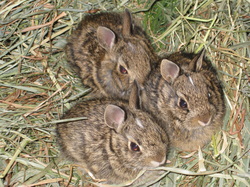
Babies are old enough to be on their own.
Bunnies & fawns are very different. If you find a fawn laying on the ground or in some bushes LEAVE IT ALONE! Mom is most likely watching from afar. Unless it is injured or bleating constantly, it is not orphaned. Deer often tuck their baby away in a safe place and stay away except to feed to keep predators from finding the baby. Fawns are by far the most commonly kidnapped babies! When well meaning people come across that tiny baby just laying in the brush there, they mistakenly assume it is orphaned. This is normal and they should be left alone!
A rabbit nest is often no more than a shallow depression in the ground lined with fur and grass. It could be in the middle of your lawn or right next to your pool! Many times people accidentally disturb them. If you find a nest and there are young, eyes closed babies scattered about, gently put them back into the nest. If the babies have eyes open and are about the size of little tennis balls they are not orphaned. Rabbits mature very quickly and bunnies this size are old enough to be on their own. Leave them be.
Sometimes a nest is not discovered until it is damaged or destroyed somehow. Do not fear, you can easily repair that nest. Just dig out the depression again and use the disturbed nesting material from the original nest or grass to line it and place the babies back in there, being careful to cover them with some of the grass or fur to keep them warm. Do not worry about handling the babies. It is a myth that mom will reject the babies if they have human scent on them. If you can not dig out the original nest, make sure you dig out a new one as close as possible to the original one. Mom only visits them twice a day to feed so they are not orphaned just because you do not see the mother around. If there is the concern of dogs getting at the nest, we use what we call a bunny box to cover the nest. It is basically a large box of some type placed upside down over the nest. There have to be exit holes, big enough for the mom, cut out on all 4 sides. Mom does not like feeling cornered and needs to have multiple exits for escape or she may not return there. Depending on the type of box used, enough weight needs to be put on top to prevent dogs from being able to push it over.
A rabbit nest is often no more than a shallow depression in the ground lined with fur and grass. It could be in the middle of your lawn or right next to your pool! Many times people accidentally disturb them. If you find a nest and there are young, eyes closed babies scattered about, gently put them back into the nest. If the babies have eyes open and are about the size of little tennis balls they are not orphaned. Rabbits mature very quickly and bunnies this size are old enough to be on their own. Leave them be.
Sometimes a nest is not discovered until it is damaged or destroyed somehow. Do not fear, you can easily repair that nest. Just dig out the depression again and use the disturbed nesting material from the original nest or grass to line it and place the babies back in there, being careful to cover them with some of the grass or fur to keep them warm. Do not worry about handling the babies. It is a myth that mom will reject the babies if they have human scent on them. If you can not dig out the original nest, make sure you dig out a new one as close as possible to the original one. Mom only visits them twice a day to feed so they are not orphaned just because you do not see the mother around. If there is the concern of dogs getting at the nest, we use what we call a bunny box to cover the nest. It is basically a large box of some type placed upside down over the nest. There have to be exit holes, big enough for the mom, cut out on all 4 sides. Mom does not like feeling cornered and needs to have multiple exits for escape or she may not return there. Depending on the type of box used, enough weight needs to be put on top to prevent dogs from being able to push it over.
When Rescue Is Needed
If rescue is advised & you are prepared to transport the animal, here is how you can make the animal more comfortable for transport. Always have an adult handle the animal and wear gloves. Punch holes into a cardboard box or other container & line it with an old T-Shirt or soft cloth. Use a towel to cover the animal then scoop it up gently & place it in the container. Put the container in a warm, dark, quiet place away from pets, children & noise until the animal can be transported. Do not give the animal any food or water. Many are in shock and doing so can make them worse or even cause their death.
Transport the animal ASAP keeping the container out of direct air conditioning & heat, keep the radio off and talking to a minimum.
We do not handle birds, however you can find a list of rehabilitators that do and information on what to do if you find one here. The top 3 links on our links page are websites that will help you find a rehabilitator for a particular state and species.
Transport the animal ASAP keeping the container out of direct air conditioning & heat, keep the radio off and talking to a minimum.
We do not handle birds, however you can find a list of rehabilitators that do and information on what to do if you find one here. The top 3 links on our links page are websites that will help you find a rehabilitator for a particular state and species.
